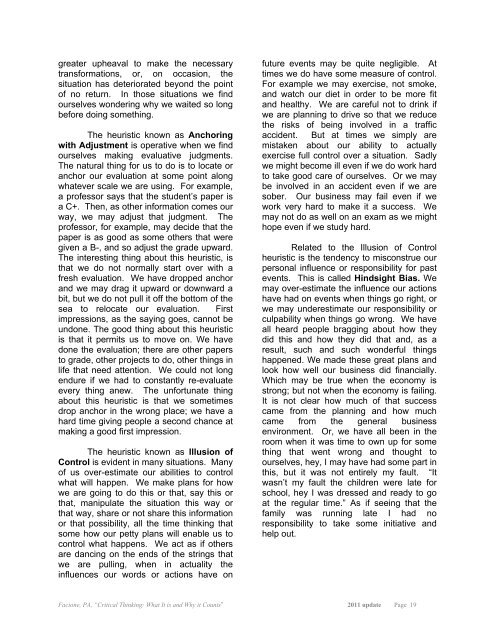Critical Thinking for Transformative Justice
Critical Thinking for Transformative Justice
Critical Thinking for Transformative Justice
You also want an ePaper? Increase the reach of your titles
YUMPU automatically turns print PDFs into web optimized ePapers that Google loves.
greater upheaval to make the necessary<br />
trans<strong>for</strong>mations, or, on occasion, the<br />
situation has deteriorated beyond the point<br />
of no return. In those situations we find<br />
ourselves wondering why we waited so long<br />
be<strong>for</strong>e doing something.<br />
The heuristic known as Anchoring<br />
with Adjustment is operative when we find<br />
ourselves making evaluative judgments.<br />
The natural thing <strong>for</strong> us to do is to locate or<br />
anchor our evaluation at some point along<br />
whatever scale we are using. For example,<br />
a professor says that the student’s paper is<br />
a C+. Then, as other in<strong>for</strong>mation comes our<br />
way, we may adjust that judgment. The<br />
professor, <strong>for</strong> example, may decide that the<br />
paper is as good as some others that were<br />
given a B-, and so adjust the grade upward.<br />
The interesting thing about this heuristic, is<br />
that we do not normally start over with a<br />
fresh evaluation. We have dropped anchor<br />
and we may drag it upward or downward a<br />
bit, but we do not pull it off the bottom of the<br />
sea to relocate our evaluation. First<br />
impressions, as the saying goes, cannot be<br />
undone. The good thing about this heuristic<br />
is that it permits us to move on. We have<br />
done the evaluation; there are other papers<br />
to grade, other projects to do, other things in<br />
life that need attention. We could not long<br />
endure if we had to constantly re-evaluate<br />
every thing anew. The un<strong>for</strong>tunate thing<br />
about this heuristic is that we sometimes<br />
drop anchor in the wrong place; we have a<br />
hard time giving people a second chance at<br />
making a good first impression.<br />
The heuristic known as Illusion of<br />
Control is evident in many situations. Many<br />
of us over-estimate our abilities to control<br />
what will happen. We make plans <strong>for</strong> how<br />
we are going to do this or that, say this or<br />
that, manipulate the situation this way or<br />
that way, share or not share this in<strong>for</strong>mation<br />
or that possibility, all the time thinking that<br />
some how our petty plans will enable us to<br />
control what happens. We act as if others<br />
are dancing on the ends of the strings that<br />
we are pulling, when in actuality the<br />
influences our words or actions have on<br />
future events may be quite negligible. At<br />
times we do have some measure of control.<br />
For example we may exercise, not smoke,<br />
and watch our diet in order to be more fit<br />
and healthy. We are careful not to drink if<br />
we are planning to drive so that we reduce<br />
the risks of being involved in a traffic<br />
accident. But at times we simply are<br />
mistaken about our ability to actually<br />
exercise full control over a situation. Sadly<br />
we might become ill even if we do work hard<br />
to take good care of ourselves. Or we may<br />
be involved in an accident even if we are<br />
sober. Our business may fail even if we<br />
work very hard to make it a success. We<br />
may not do as well on an exam as we might<br />
hope even if we study hard.<br />
Related to the Illusion of Control<br />
heuristic is the tendency to misconstrue our<br />
personal influence or responsibility <strong>for</strong> past<br />
events. This is called Hindsight Bias. We<br />
may over-estimate the influence our actions<br />
have had on events when things go right, or<br />
we may underestimate our responsibility or<br />
culpability when things go wrong. We have<br />
all heard people bragging about how they<br />
did this and how they did that and, as a<br />
result, such and such wonderful things<br />
happened. We made these great plans and<br />
look how well our business did financially.<br />
Which may be true when the economy is<br />
strong; but not when the economy is failing.<br />
It is not clear how much of that success<br />
came from the planning and how much<br />
came from the general business<br />
environment. Or, we have all been in the<br />
room when it was time to own up <strong>for</strong> some<br />
thing that went wrong and thought to<br />
ourselves, hey, I may have had some part in<br />
this, but it was not entirely my fault. “It<br />
wasn’t my fault the children were late <strong>for</strong><br />
school, hey I was dressed and ready to go<br />
at the regular time.” As if seeing that the<br />
family was running late I had no<br />
responsibility to take some initiative and<br />
help out.<br />
Facione, PA, “<strong>Critical</strong> <strong>Thinking</strong>: What It is and Why it Counts” 2011 update Page 19

















